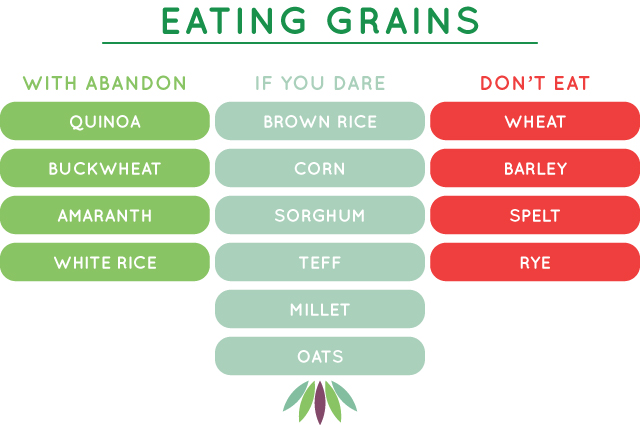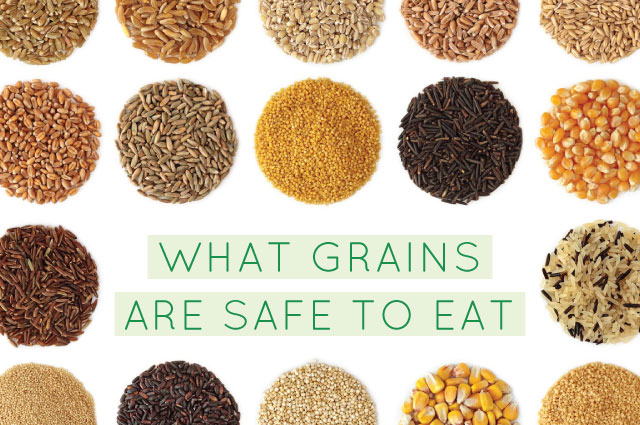Grains are the food most strongly associated with mortality. I suggest only eating non-gluten grains – if you tolerate them. Let’s delve into what grains are safe to eat and which are not.
Most cavemen did not eat grains, so we’re not very well genetically adapted to them. Grains are low in nutrients and contain toxins that promote an unbelievably long list of health conditions and disease. These toxins are called phytates, lectins and gluten. To learn more about these evildoers, see my article Less Grains More Brains. Compared to all other foods, grains have the lowest nutrient content, just beating out sugar in a nutrition contest! Not very impressive.
Grains are also the only food where manufacturers are allowed to make health claims on the packaging – nonsense like grains lower cholesterol. They actually raise cholesterol! Beware of manufacturer claims you see on boxes, as none are backed by credible research. The thinking goes like this: Grains contain fiber, fiber lowers cholesterol, so the leap is made that Grains = Lower Cholesterol. Wrong! This is sales logic. The toxins in grains cause so many other health problems, including skyrocketing your blood sugar, that they in fact cause high cholesterol.
In reality, wheat, of all foods, is the most highly correlated with mortality (3). Please do not eat Cheerios thinking they are healthy or will lower your cholesterol like they claim on the box! I’m ashamed to admit I actually used to buy Cheerios thinking they were a healthy food choice. They were, but only compared to all the sugary poison next to them in the cereal aisle. Additionally, don’t eat oatmeal thinking that it will be a miracle cure for your cholesterol. Not going to happen.
What Grains Should I Eat?
If you’re going to eat grains, some choices are better than others. The graph below indicates what the research shows are grains that promote disease because they contain gluten, grains that are okay to eat every once in a while (if you dare) and grains that are perfectly safe to chow with abandon.
 If you do choose to eat grains, they must be prepared properly to make them more digestible. This is accomplished by soaking them overnight with a little apple cider vinegar prior to cooking. Soaking reduces the phytic acid content, but does not reduce lectins, one of the more problematic contents in grains. Groups like the Weston A. Price Foundation have been talking about this for a long time. There’s no traditional or tribal people that ate unfermented, unprepared grains as a regular part of their diet.
If you do choose to eat grains, they must be prepared properly to make them more digestible. This is accomplished by soaking them overnight with a little apple cider vinegar prior to cooking. Soaking reduces the phytic acid content, but does not reduce lectins, one of the more problematic contents in grains. Groups like the Weston A. Price Foundation have been talking about this for a long time. There’s no traditional or tribal people that ate unfermented, unprepared grains as a regular part of their diet.
I know what some of you are thinking – that I’m completely insane for saying that white rice is better for you than brown rice. But it’s true!! According to The Perfect Health Diet by Dr. Paul Jaminet and his wife, long grain white rice is the only grain you should eat. Brown rice contains the intact grain husk where most of the toxins reside. It may contain the nutrients, but they are not worth the harmful effects of the toxins (phytates and lectins). Remove the husk, and you have yummy starchy brain fuel. This should serve as rice’s purpose. According to the China Study, rice has a -58 percent correlation with mortality. This is incredibly low. Being the least toxic grain, white rice is very safe to eat. I never liked brown rice anyhow.
Grains like quinoa, buckwheat, amaranth and millet are considered pseudograins, meaning they are not really grains. (3) Actually, the are seeds and don’t share some of the inherent problems that plague cereal grains. They are fine for many and may be consumed with abandon. However, I tend to avoid millet because it is one of the most goitrogenic foods, meaning it can interfere with thyroid function. Quinoa is a strange one. I’ve read that it’s a seed, a vegetable, a fruit, etc. Basically, no one seems to know what the hell it is. Just eat it.
Oh yeah, before I forget. All the poor cows and chickens are force-fed grains. That means your meat is full of grains and their toxins. One must be wary of these hidden grains. Most of the meat you buy at the grocery store or at restaurants, even if organic, was fed grains. This is especially problematic if you are sensitive to grains, as this meat will cause health issues for you like you were eating the grains themselves. I know this first-hand, if only because when I feed my stupid dog grain fed meat, she breaks out itching ferociously for two weeks and tears out all her fluff. She is very intolerant of grains. Poor doggy. Grass fed meat is the only choice for those looking to avoid grains.
Grain Sensitivities
Preferences and tolerances vary over gluten-free grains. I regularly eat corn tortillas and blue corn chips (crazy-high in cancer-fighting selenium). A friend of mine can only tolerate sprouted corn tortillas because the corn is predigested, if you will, by the sprouting. This makes the corn much easier to digest. Countless people have a food sensitivity to corn in the US because it is found in so many food products that we eat. (5) In places like England, beet sugar is used in all the processed food so they have a rampant beet sensitivity. This is simply from overconsumption of a single food.
When we eat too much of one food, our bodies are programmed to reject it. You must determine for yourself which grains work for you, meaning to which you do not have a sensitivity. This is easily determined with an elimination and challenge diet. Instructions on how to do an elimination diet can be found on my article Food Sensitivities Make You Sick and Fat. One common hallmark of a food sensitivity is a stomachache within a few hours of eating a grain (or other food). I went to doctors for years to try and figure out why my stomach hurt all the time. None could figure it out! Duh! It was stomach inflammation cause by a gluten sensitivity.
Cheater Cheater Pumpkin Eater
If you’re planning to cheat and eat some of the grains we should be avoiding, which we know happens from time to time, I have a couple recommendations. We are all human and it can be difficult to avoid all of grain’s delectable offerings.
I have learned from a Los Angeles-based immunologist, Dr. Bernard Gellar, that sourdough bread and wheat pasta may be tolerated well by people who don’t suffer from a bad sensitivity to gluten. Sourdough bread has been fermented and processed (properly prepared), destroying much of the gluten. Personally, I am able to eat sourdough bread without getting a stomachache even though I am sensitive to gluten. Pasta also undergoes a high amount of processing, making it possible for many to eat this due to its low gluten content.
The Final Word
Even though most people can indulge in less healthy choices from time to time without negative consequences, wheat and other gluten-containing grains should, in my opinion, be completely avoided, especially for those who suffer any kind of autoimmune disease, arthritis, digestive or inflammatory condition. When it comes to things that we humans are not adapted to eat and digest, wheat and its gluten protein is probably at the top of the list.
When you begin to review the evidence stacked up against whole grains, it becomes rather self-evident that our reliance on wheat and other grains may be one of the primary culprits for the poor health of so many. Grains, with the exception of white rice, are the food most strongly associated with mortality (1). Positive changes are often noticed immediately after removing wheat and other gluten containing grains from the diet. Skip them and see what happens.
Gluten Digesting Enzymes
Gluten happens. If all else fails, you fall off the gluten-free wagon or you find yourself at a restaurant where gluten is likely lurking in the food, be sure to have a bottle of Glutenza handy. I always have a bottle with me when I eat out!
Update 9-8-13
Chris Kresser made a very interesting speech at the Ancestral Health Symposium in 2013. He postulated that the reason we don’t tolerate grains so well is not because we can’t digest them, but because we’re missing the crucial gut bacteria needed for their digestion. Many hunter-gatherer cultures discovered by Weston A. Price thrived on diets comprised of grains. How could this be if grains are so detrimental to our health?
A theory that’s prevalent in the Paleo community goes something like this: the shift from a hunter-gatherer lifestyle to agriculture led to an increase in disease and a decline in health. There’s no doubt this is true, but the idea that compounds like gluten and lectins were responsible for this decline isn’t very well supported by the evidence. Significant increases in chronic inflammatory disease didn’t happen for the most part until the last hundred years. Yet, the change from a hunter-gatherer lifestyle to agriculture happened roughly 10,000 years ago. So there has to be something else that explains this decline in health. If it were true that gluten and lectins in grains significantly increased the risk of disease, they would have done that long ago.
Chris Kresser postulates a very interesting theory that it’s possible that these potentially harmful compounds in new foods are not a significant risk factor for inflammatory disease as long as the Paleolithic microbiome – our gut bugs – is still intact. When our microbiome is depleted or deficient, then these foods can become risk factors for inflammatory disease. Unprotected from adequate colonies of probiotics, we develop leaky gut, food intolerances, allergies, autoimmune issues, inflammatory conditions like asthma and a host of other diseases.
Chris Kresser went on to say in his speech that if we still had the Paleolithic microbiome intact, we could tolerate grains and all of these compounds with no problem. This point is key because it resolves some of the apparent conflicts in the ancestral paradigm. It can explain the reason many cultures ate grains for thousands of years and the health conditions we attribute to grains were incredibly rare.
You can expand your Paleo diet. Some people who spend time overhauling their gut bacteria are able to introduce grains, dairy or other non-Paleo foods – even if they’ve had previous intolerances – and do just fine. It also explains why some people are able to tolerate those foods with apparently no problems while others can’t. So, work on good gut health (See Probiotics) and you will be able to safely enjoy grains and other foods not Paleo given you don’t have food intolerances to them for other reasons.
Have I left anything out? Did it take you forever to figure out you had a sensitivity to grains? Which grains seem to be working for you? Tell me your story by leaving a comment below.











